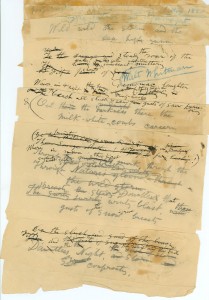The problem with settling on a first pass of a statement is that it may reveal that we still don’t know what we think.
There are times when the right medium for addressing another is the written word. An extended statement provides space to dwell on necessary complexities, make a case with sufficient amplification and evidence, and possibly guide readers towards an action they have been reluctant to take. Good writing is coherent, interesting, and expansive. Whether we’re working on an essay, report or letter; we know when we need to make the most of ideas laid down on the page or its electronic equivalents. This is a ritual for high school students working on the perfect essay to a selective college, the office worker on deadline to finish a report that will be seen by peers and management, or the citizen making a case to reluctant officials or neighbors.
In her useful book for writers, Bird By Bird, Anne Lamott declares unequivocally that every writer needs to get past the “shitty first draft.” It’s her not-so-gentle way to remind budding scribes to take at least several more passes over the prose they are usually too ready to accept as sufficiently worked out.
Part of the problem with settling on a first draft of any extended statement is that it reflects the likely fact that we aren’t yet clear about what we know or believe. Clarity comes when the theme of a piece begins to reveal itself, sometimes late in the process.

Occasionally the last summarizing statement of an essay is the very first thing that should be said. But we don’t know that until we’ve finished the chain of thought that gets us there. This is because we often think inductively from cases to conclusions. But ideas on the page need a reverse process of deduction. Major claims usually should come first. And there’s the rub; we first have to discover them, lest we do the equivalent of showing up at a great party just as it’s winding down.
I suspect I’m not the only one to notice that after a day or so, my first drafts look dead on arrival. They are usually confusing, wordy, and both over-written and underdeveloped. Having discovered what I really think, successive drafts refine the process. With time it usually becomes clear that the points I wanted to make can be said with greater economy and clarity.
The left hemisphere of the brain thinks in language, and it’s sometimes only too happy to stay on the case longer than the rest of our mind.
A writer also discovers that the act of revising is enough to set the mind off on its own extended tour of the landscape that is being surveyed. This is a curious phenomenon. It turns out that not all writing happens when a person is formally on task. Better ways to make points force their way into our consciousness even when we move on to other things, like walking or trying to sleep. The left hemisphere of the brain thinks in language, and it’s sometimes only too happy to stay on the case longer than the rest of our mind.
We can also be eternally grateful that word processing makes edits so easy. A few writers like to work out ideas in longhand, often on a legal pad. But most have found the advantages of word processing programs that make changes easily, with the added usefulness of spell checkers and a thesaurus. The latter tool can help find not just another word for a feeling or idea, but possibly the best word.
I think I have only known one person who wrote and spoke in more or less “finished” prose. This historian was a phenomenon to listen to: a good scholar, amazingly fluent and a gifted lecturer. It was a relief when he moved to another state.
Perhaps these modest blog posts look like they are dashed off as more or less complete pieces. If it were only so. Most take several weeks to develop, going through a dozen or more alterations. The process expands exponentially for a book. Many authors I know take years to refine and polish a manuscript. When it’s done well the finished work of a good writer scans so easily. And that’s the irony of graceful prose. It’s like sculpture. Revision helps it take on a naturalness and clarity that makes it easy to ignore the unnecessary bits that have been carved away.
![]()
